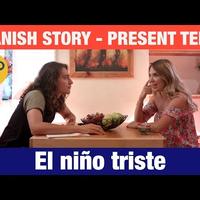Spanish Story | Present Tense | El niño triste
Hola.
Hola.
Te voy a contar algo.
¿Qué pasó?
Imagínate esto. Estoy en el parque.
¿En el parque?
Sí, en el parque. Y veo a un niño.
¿Qué ves?
A un niño.
Y el niño está triste.
Qué mal.
y el niño llora y llora.
Yo tengo un helado.
¿Qué tienes?
Un helado.
Y le doy mi helado al niño.
y el niño
se pone feliz.
Qué bien.
Y sonríe.
Pero el niño ya no tiene helado
y está triste.
¿Y qué hace el niño?
Llora y llora.
Qué mal.
Y yo
tengo un chocolate.
¿Qué tienes?
Un chocolate.
Y le doy mi chocolate al niño.
Y el niño está feliz
y sonríe.
Qué bien.
Y luego el niño ya no tiene chocolate
y está triste.
¿Y qué hace el niño?
Llora y llora.
Qué mal.
pero yo tengo unas uvas.
¿Tienes unas uvas?
Sí.
Y le doy mis uvas al niño.
y el niño está feliz.
¡Qué bien!
Pero el niño ya no tiene uvas.
Y el niño está triste.
¿Y qué hace el niño?
Llora y llora.
Y yo ya no tengo helado.
Ya no tengo chocolate.
Y ya no tengo uvas.
¿Y qué pasó?
Al final, el niño ve a su papá
y se pone feliz.
Qué bien.
Y se va con su papá.
Qué bueno por el niño.
Yo también tengo algo que contarte...

